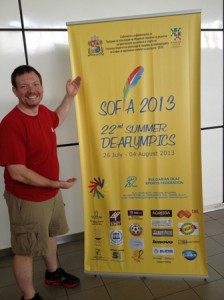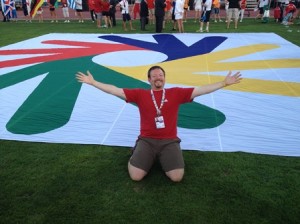By Erika Steele, Contributing Writer

Marlborough – In February, many of the world's most talented and gifted athletes will gather on the?Black Sea?coast in Sochi, Russia, for the 2014 Winter Olympics. The event will draw millions of viewers from across the globe as they cheer for their country's best athletes. This past July, a similar display occurred on a smaller scale when the Deaflympics took place in Sofia, Bulgaria, 89 years after its inaugural event in Paris.
Though some may be unaware of the Deaflympics, Christopher Kaftan is not in that group. The Marlborough resident is secretary general of the USA Deaf Sports Federation (USADSF) and secondary principal at The Learning Center for the Deaf in Framingham??”two organizations he has volunteered with for over a decade. His reason? To create equality for athletes in regard to financial support from the U.S. Olympic Committee (USOC). Currently the committee only funds the Olympics and Paralympics.
“It is my hope and dream that within the next 10 years, our deaf and hard-of-hearing athletes will have parity with other elite athletes,” he said, adding that full sponsorship, support, and training coverage should be provided by the USOC.

Photos/submitted
Kaftan grew up in Woodstock, N.Y., but earned much of his education in the metro Washington, D.C., area where he settled down to start a family. He moved from Maryland just last year when he joined The Learning Center for the Deaf.
Kaftan was born hearing but became deaf at the age of two from spinal meningitis. When he was a college student, the deaf community introduced him to the USADSF. He quickly became involved in 2001 as a sports journalist intern, a position that took him to the summer Deaflympics in Rome that same year.
“It is unbelievable watching the caliber of the athletes,” he said, noting that fear held him back from trying out himself for the soccer or wrestling teams. “These are truly elite athletes that sacrifice many parts of their personal or professional lives for the chance to win a gold medal.”
When he returned to the USADSF in 2008 as the communications specialist, he knew the organization was more than temporary. Two years later, he was elected to the board as the secretary general in 2010, a position he will serve until his term expires in November. This past July was his third Deaflympics.
Still, the athlete in Kaftan loves competition. When asked what is his favorite aspect of the Deaflympics, his answer is quick: “The athletic competition. Period. Nothing else beats seeing USA winning gold.”
In Sofia, Kaftan was able to watch the U.S. come away with 29 total medals, an improvement over how many times they reached the medal stand four years ago in Taiwan.
But the goal is not just about gold.
“The first goal of our athletes is to win a medal,” Kaftan explained. “The next experience they face is meeting other deaf and hard of hearing athletes from all over the world. At the Opening Ceremonies, you will be in the same stadium with 4,000 of the world's best deaf athletes. It's a humbling experience.”
One hundred twenty-nine Deaflympians, including 30 first-timers, competed in Bulgaria in 14 different sports alongside their 22 coaches, 12 staff, and 10 athletic trainers.
As explained on the USADSF's website and echoed by Kaftan, “Our athletes play important roles as ambassadors within the U.S. and around the world. They serve, actively or simply by example, as role models for deaf and hard of hearing youth across the country.”
USADSF was founded in 1945 and is the federation responsible for the USA Deaflympics team. Its purpose is to foster and regulate uniform rules of competition and promote fitness among deaf and hard of hearing members of all ages, including the assistance of U.S. teams in international competitions such as the Deaflympics.
The Deaflympics are the world's second oldest athletic competition after the Olympics. The next summer competition will be 2017 in Ankara, Turkey, with the Winter Deaflympics taking place in 2015.











